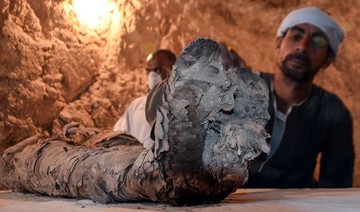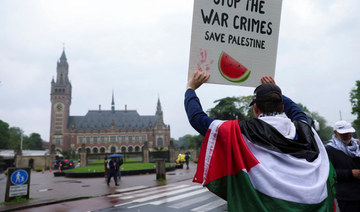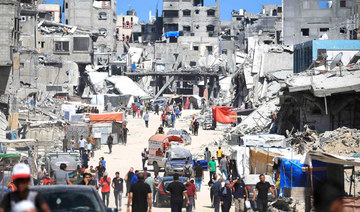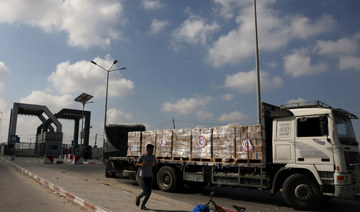ASWAN, Egypt: Siham Othman was born decades after her grandparents were forced to evacuate from their homes on the banks of the Nile River along with tens of thousands of their fellow Nubians. But she has a lifelong bond with her ancestral homeland.
Her grandfather became a merchant sailor and traveled the world. Yet when he told her stories, they were only about Nubia.
“He is the one who planted the dream of return in me,” said the 30-year-old Osman.
Osman and a young generation of Nubian activists have revived the cause of their people. They are trying to preserve Nubians’ unique culture and identity and are campaigning for a return to their traditional lands.
Their timing could not have been worse.
Recent marches by Nubians were swiftly silenced by the government of President Abdel-Fattah El-Sisi, which has shown little tolerance for dissent. Osman is among 50 Nubian activists on trial for participating in protests, potentially facing up to five years in prison if convicted.
To a state dominated by the military and security agencies, Nubians’ assertion of their distinct identity and heritage amid the Arab majority looks like a threat to stability.
Nubians are an ancient ethnic group that, since Pharaonic times, lived along the Nile in what is now southern Egypt and northern Sudan. Darker skinned than most Egyptians, they have a distinct culture and a language unrelated to Arabic. There is no firm data, but some 3.5 to 5 million of Egypt’s more than 90 million people are estimated to be Nubians.
Older Nubians vividly recall life in their original land. They talk of sprawling villages with large houses painted in brilliant colors, with lands made fertile by sediment from annual floods. Most important was the bond with the Nile. They “baptized” their children in its waters. On holidays they set dishes to float away on its current.
The 20th century brought a series of displacements, starting with construction of the first reservoir at Aswan in 1902. The last and biggest came 50 years ago when Egypt built the Aswan High Dam; the government moved some 55,000 out of their homes in 1963 and 1964 as the creation of Lake Nasser flooded the Nubians’ entire homeland.
The government told Nubians they were making a sacrifice for Egypt’s progress. In return, authorities promised they would receive new, model homes with electricity, running water, farmlands and a prosperous future.
The Nubians were moved to 44 new villages north of Aswan. What they found was a startling blow. In some villages, houses hadn’t been built yet — there were just chalk outlines. Houses that were ready were small and cramped, often without running water or electricity. Farmland couldn’t be farmed because a canal hadn’t been built.
Even worse for the Nubians, most of the villages were miles from the Nile.
“People felt they were deceived and the first few years here were very tough,” Mohammed Dawoud, 71, recalled as he sat in a mosque after the sunset prayers in the Nubian town of Abu Simbel.
In the decades since, Nubian towns — like many others in southern Egypt — have sunk into poverty. Many Nubians have moved to larger cities like Cairo, Alexandria or Aswan, searching for jobs. Customs have withered. Though some still speak Nubian at home, the language is not taught in schools.
Young Nubian activists say that after the trauma of displacement, the older generation largely accepted whatever the government gave them. They say they are more determined to push for their rights and less willing to put up with discrimination.
“The older generation of Nubians accepted the status quo,” said Osman, who was born in Aswan. “Their activism was restricted to conferences, but no street activism. Now there is a new spirit.”
In 2014, there seemed to be a breakthrough when the new constitution included a clause for the first time recognizing Nubians as an ethnic group and committing the state to organize their return to traditional lands by 2024.
But so far, nothing concrete has been done, activists say.
To keep up pressure, activists have attempted several protests. In 2016, a convoy of cars set out from Aswan toward Nubian lands. They were intercepted by security forces and forced to go back. Last September, around 100 Nubians marched through Aswan, singing traditional songs and beating drums. Police arrested more than two dozen. One of them, an activist suffering from health issues, died in custody, prompting a new protest and further arrests.
Security agencies appear to have imposed their hand. After the constitution’s passage, parliament drafted a law for developing Nubian lands, but intelligence agencies objected to some provisions, said a senior official involved in the issue. He spoke on condition of anonymity because he was not authorized to talk to the media.
Later, El-Sisi issued a decree expanding a security zone along the border with Sudan, an entry point for militants joining an insurgency in the Sinai Peninsula. The expansion put a number of areas the Nubians want to return to inside the zone, where settlement is barred.
In May, parliament created an agency to economically develop southern Egypt, but it made no specific mention of the Nubians. Activists say the law aims to dilute their cause by grouping it in with broader development.
During a visit to Aswan last year, El-Sisi spoke broadly about fulfilling Nubian demands, but talked about development without mentioning return.
Nubians also face the attitude that recognizing their identity and link to the land threatens Egypt’s stability. In parliament debate, speaker Ali Abdel-Al echoed this idea, saying the constitutional clause about Nubians is “a land mine.”
Fatmah Imam, a Nubian activist born in Cairo, said that during her university days, the message instilled was that Egypt should be homogeneous.
“This country has so many colors and ethnicities, and it is so destructive that we are trying to give it just one identity,” she said. “I see Egypt as a mosaic.”
Egypt’s young Nubians revive dream of return to homeland
Egypt’s young Nubians revive dream of return to homeland

- Siham Othman was born decades after her grandparents were forced to evacuate from their homes on the banks of the Nile River along with tens of thousands of their fellow Nubians
- Recent marches by Nubians were swiftly silenced by the government of President Abdel-Fattah El-Sisi, which has shown little tolerance for dissent
The US government staffers putting principle over paycheck amid Israel’s Gaza assault
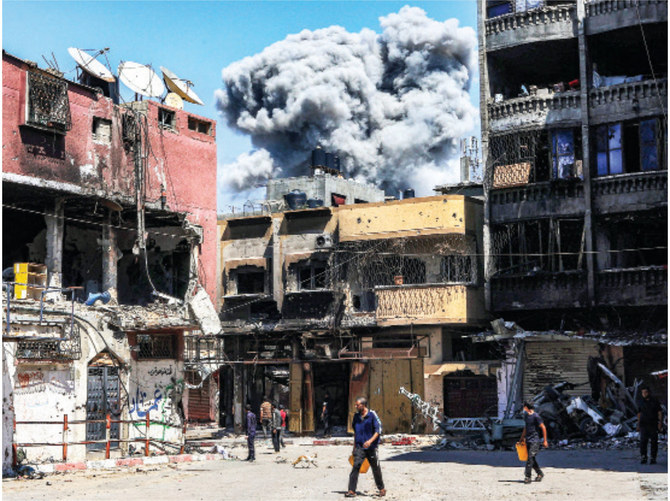
- Appalled by the death of Palestinians, former staffer says she “could not in good conscience remain in government”
- Concerned about America’s standing in the Middle East, many want the US to suspend arms sales to Israel
LONDON: Lily Greenberg-Call recently became the latest Biden administration official to step down in protest over the White House’s handling of the war in Gaza, amid a string of resignations from the US Department of State.
Greenberg-Call, who left her position at the Department of the Interior in mid-May, slammed the Biden administration for having “enabled and legitimized” Israel’s onslaught on the Gaza Strip.
In her resignation letter she said she “can no longer in good conscience continue to represent this administration amidst President Biden’s disastrous, continued support for Israel’s genocide in Gaza.”
Biden’s policy in the Middle East has repeatedly come under fire since the onset of Israel’s military campaign in Gaza, particularly over the supply of weapons to the Israel Defense Forces, which rights groups say have been used to harm civilians.
The Israeli military’s bombing campaign in Gaza in retaliation for the Hamas-led Oct. 7 attack on southern Israel has killed at least 35,000 Palestinians, razed entire neighborhoods, destroyed the enclave’s infrastructure, and displaced 90 percent of the population.
Israel and senior figures in the Biden administration have said Hamas shares in the blame for the high civilian death toll in Gaza.
Jake Sullivan, the US national security adviser, has previously said that Hamas’ tactics have placed “an incredible burden on the IDF, a burden that is unusual for a military in today’s day and age,” by hiding behind civilians as it conducts its war with Israeli forces.
The day Greenberg-Call resigned, the Biden administration told Congress it planned to send $1 billion in new military aid to Israel, despite the president’s opposition to a full-scale invasion of Rafah in southern Gaza, the Associated Press reported. It will be the US’ first arms shipment to Israel since Biden paused the transfer of 3,500 bombs earlier in the month.
Israeli Prime Minister Benjamin Netanyahu announced in April that Israeli troops would expand operations into Rafah — Gaza’s southernmost city. On May 6, Israel mounted a limited operation in Rafah, seizing control of its border crossing with Egypt.
The US government said it had halted the bomb shipment to prevent Israel from using the munitions in its attack on Rafah, an area densely populated with civilians, most of whom have been displaced multiple times.
However, a lower chamber bill on May 16 condemned Biden for the suspension and voted to override it, with Republicans saying the president should not dictate how Israel uses American weapons in its war against Hamas.
But the US Arms Export Control Act of 1961 gives the President the authority to halt — or even terminate — American arms transfers if he finds that the recipient country “has used such articles for unauthorized purposes,” according to a 2020 report by the Congressional Research Service.
The vote prompted some 30 Congressional staffers to march to the base of the steps of the House of Representatives at the US Capitol, calling for a ceasefire in Gaza and protesting the vote.
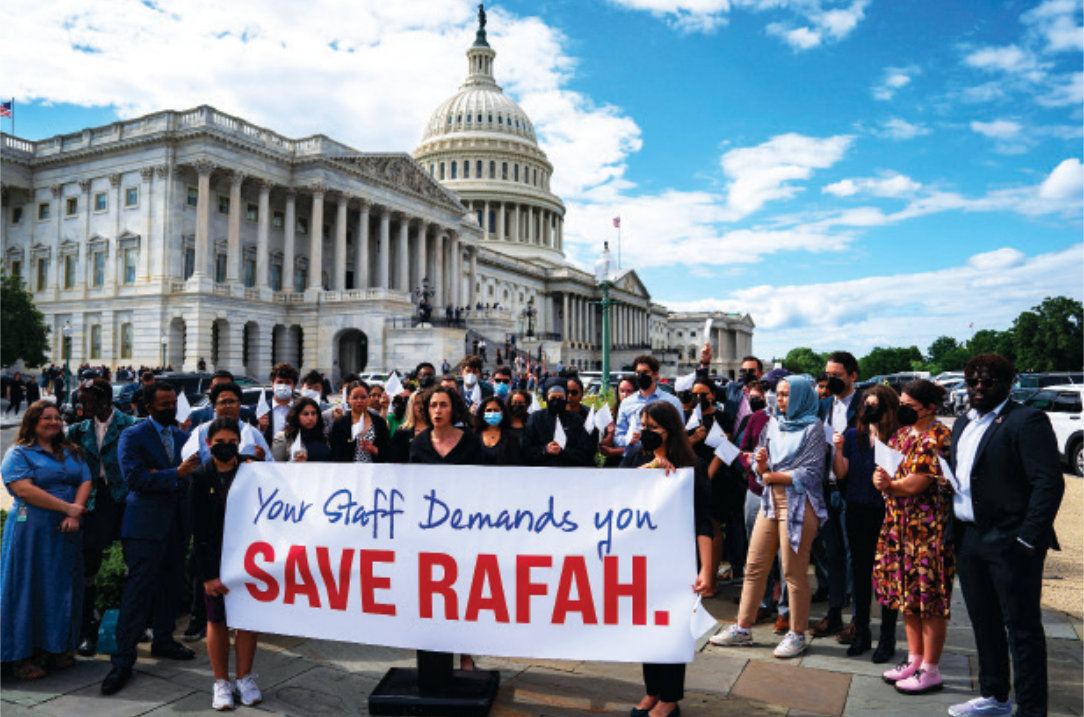
After announcing the halt on the bomb shipment, Biden told CNN that US-manufactured weapons had been used to kill civilians in Gaza.
“Civilians have been killed in Gaza as a consequence of those bombs and other ways in which they go after population centers,” he said on May 8.
“I made it clear that if they go into Rafah — they haven’t gone in Rafah yet — if they go into Rafah, I’m not supplying the weapons that have been used historically to deal with Rafah, to deal with the cities — that deal with that problem.”
According to the Washington Post, the US has made more than 100 weapons sales to Israel since the start of the war in Gaza. The sales reportedly included precision-guided munitions, small-diameter bombs, bunker busters, small arms, and more.
In late April, human-rights monitor Amnesty International submitted a 19-page report to US authorities claiming that US weapons provided to Israel had been “used in serious violations of international humanitarian and human rights law, and in a manner that is inconsistent with US law and policy.”
The newly revised US Conventional Arms Transfer Policy, released in February last year, stipulates “preventing arms transfers that risk facilitating or otherwise contributing to violations of human rights or international humanitarian law.”
Hala Rharrit, who stepped down as the Arabic-language spokesperson of the US Department of State in April after 18 years of service over the Biden administration’s policy on Gaza, stressed that the government should “abide by our own laws.”
She told Arab News: “We have systems in place within the State Department to ensure that our weaponry is not used to kill civilians, with requirements put in place requiring recipient countries to limit harm to civilians — to include both civilian populations and civilian infrastructure.
“There are multiple laws on the books that we are ignoring as a State Department — willfully ignoring,” she continued. “There’s the Arms Export Control Act, there’s the Foreign Assistance Act, the Leahy Law — there are multiple regulations that would ensure what’s happening now would never happen.”
Urging the government to follow those laws, Rharrit said: “We would automatically have to condition our aid and, most specifically, cut our offensive military assistance to Israel.”
By pausing military assistance to Israel, not only “would we ensure, hopefully, that the IDF does not go into Rafah,” but also “regain credibility amongst Arab states as well — that we’re actually conditioning our aid, we’re standing by our laws, we’re standing by international law.
“And that could provide leverage as well, both on the Israeli side and with Arab states to put pressure on Hamas to reach a ceasefire. We have the ability to use our leverage as the US, but we’re not using it at the moment.”
Asked about her resignation, Rharrit said: “I never anticipated resigning, and I certainly never anticipated resigning in protest of any policy.”
But the human tragedy in Gaza “completely changed that,” she told Arab News. “I could not in good conscience remain in government. After 18 years with the State Department, I decided to finally submit my resignation.”
She added: “I spoke up internally. I made my voice and my concerns heard, not based on my personal opinions, but based on what I was monitoring — and I was monitoring pan-Arab traditional and social media.
“And I was seeing and documenting, and reporting back to Washington, all of the growing anti-Americanism… Nothing was convincing anyone, and we had lost credibility.”
Rharrit, who previously served as a human-rights officer, continued: “It’s one of the things that we (the US) are known for and that we stand for, but every day I would see human-rights violation after human-rights violation. And it was clear that we had a double standard, and I could no longer support the policy or the administration.”
Despite their expertise, Rharrit said she and her colleagues were not being heard. “Our concerns, our feedback, our documentation of everything that was happening in the region was being ignored — and that was intensely frustrating.”
She said that US policy in Gaza “is a failed militaristic policy that has achieved nothing — over 35,000 Palestinians killed, over 15,000 of whom are children, the hostages remain in Gaza with their families in Israel protesting against Netanyahu and demanding a ceasefire.”
She added: “Despite all this unimaginable suffering and countless attempts by many on the inside to shift policy, it became clear to me that the status quo was resolute.
“Knowing that this policy continued to dehumanize and devastate the Palestinians, generating a vicious cycle of violence, hurting all sides involved, while undermining the US for generations left me no choice but to speak out against the policy from outside government.”
Preceding Rharrit in late March was Annelle Sheline, a foreign affairs officer in the department’s human rights bureau, who left after trying to “raise opposition on the inside,” she told ABC News on April 11.
“Many of my colleagues, people inside the State Department, are devastated by what US policy is enabling Israel to do to Palestinians inside Gaza,” she said.
“They (the Biden administration) continue to send weapons. We’ve seen announcements of new weapons. It’s really shocking that this has been allowed to go on.”
In January, former Biden appointee Tariq Habash, a Palestinian-American, resigned from the Department of Education, saying the US administration “turns a blind eye to the atrocities committed against innocent Palestinian lives.”
In his resignation letter, which he shared on the social media platform X, Habash said his government “has aided the indiscriminate violence against Palestinians in Gaza.”
He added: “Despite claims that Israel’s focus is on Hamas, its military actions simultaneously persist across the West Bank, where there is no Hamas governing presence.”
Since Oct. 7, Israeli troops and Jewish settlers have killed at least 502 Palestinians in the occupied West Bank, according to the Palestinian Health Ministry. Israeli authorities have also arrested more than 7,000 people in the territory, according to prisoners’ affairs groups.
Ten days after Israel began its Gaza offensive, Josh Paul, a former director overseeing US arms transfers, quit the Department of State, citing “a policy disagreement concerning our continued lethal assistance to Israel.”
In a letter he posted on LinkedIn, Paul said his government’s “rushing” to provide arms to Israel was “shortsighted, destructive, unjust, and contradictory to the very values that we publicly espouse.”
He described the Hamas attack on southern Israel as “a monstrosity of monstrosities,” but said he also believed “the response Israel is taking, and with it the American support both for that response and for the status quo of the occupation, will only lead to more and deeper suffering for both the Israeli and the Palestinian people.”
Protests by US administration staffers against its policy in the Middle East have taken various forms besides public resignations. In November, more than 400 of Biden’s employees signed an open letter calling on him to urgently pursue a ceasefire in Gaza.
With the approaching US presidential election complicating Biden’s room for maneuver, the Israeli government committed to continuing its offensive, and with negotiations brokered by Qatar and Egypt making scant headway, such a ceasefire seems unlikely anytime soon.
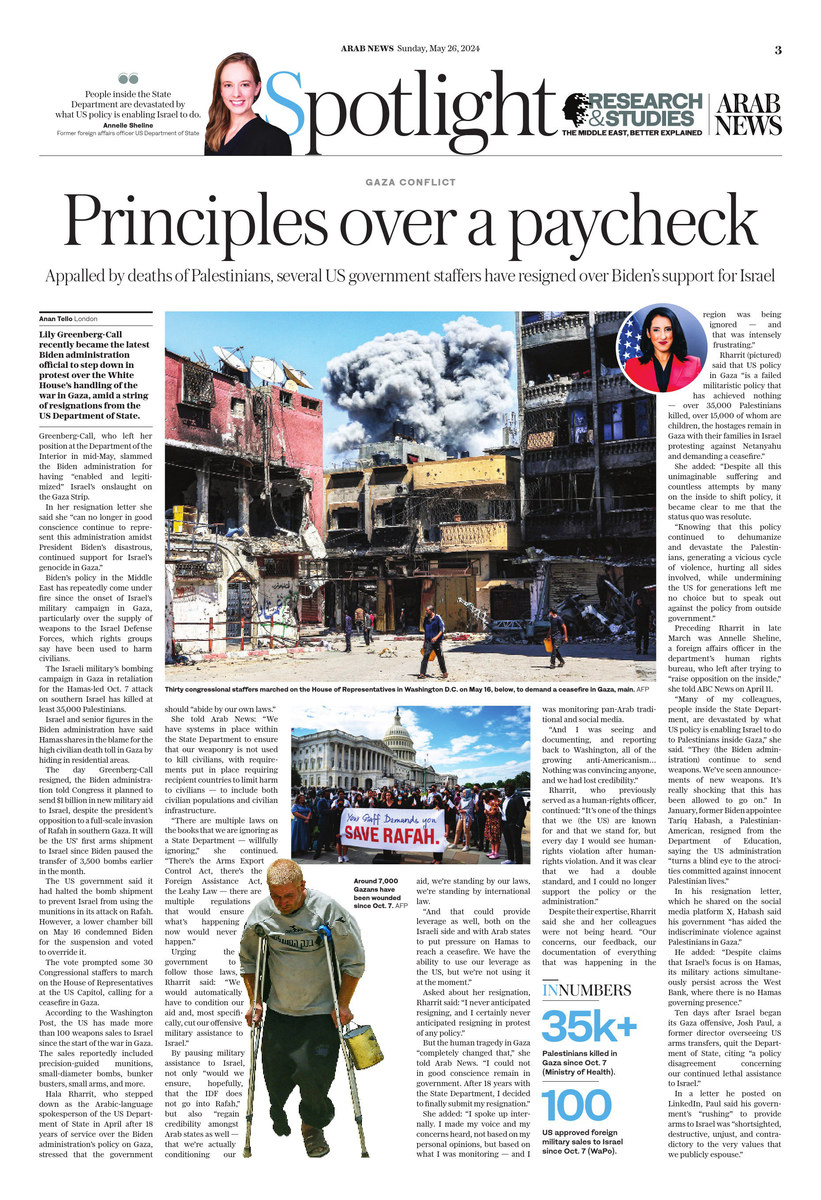
Gaza war is ‘real genocide,’ Spanish defense minister says

- Defense Minister Margarita Robles says Spain’s recognition of Palestine is not a move against Israel, adding that it is designed to help end violence in Gaza
MADRID: The Spanish defense minister said on Saturday that the conflict in Gaza is a “real genocide” as relations between Israel and Spain worsen following Madrid’s decision to recognize a Palestinian state.
Israel has strongly rejected accusations made against it by South Africa at the International Court of Justice that it is committing genocide against Palestinians, saying it is waging war on Hamas.
The remark by Spanish Defense Minister Margarita Robles in an interview with TVE state television echoed a comment by Spanish Deputy Prime Minister Yolanda Diaz, who earlier this week also described the Gaza conflict as a genocide.
“We cannot ignore what is happening in Gaza, which is a real genocide,” Robles said in the interview, during which she also discussed the Russian invasion of Ukraine and conflicts in Africa.
She also said Madrid’s recognition of Palestine was not a move against Israel, adding that it was designed to help “end violence in Gaza.”
“This is not against anyone, this is not against the Israeli state, this is not against the Israelis, who are people we respect,” she said.
Israel’s campaign in Gaza has killed nearly 36,000 Palestinians, according to Gaza health officials, and destroyed much of the enclave. Israel launched the operation to try to eliminate Hamas after the Palestinian group attacked southern Israel on Oct. 7.
Spain, along with Ireland and Norway, declared this week it would recognize a Palestinian state on May 28, prompting an angry response from Israel, which said it amounted to a “reward for terrorism” and recalled its ambassadors from the three capitals.
Judges at the ICJ, the top UN court, on Friday, ordered Israel to immediately halt its military assault on the southern Gaza city of Rafah, in a landmark emergency ruling in the case brought by South Africa accusing Israel of genocide.
On Saturday, Spain’s Foreign Minister Jose Manuel Albares said that Israel must obey the court’s ruling.
In a post on the social media site X, he said, “The International Court of Justice’s precautionary measures, including the cessation of Israel’s offensive in Rafah, are mandatory. We demand their application.”
South Africa has accused Israel of failing to uphold its obligations under the 1948 Genocide Convention.
Israel rejects the accusation, arguing it is acting to defend itself and fighting Hamas after the Oct. 7 attack.
Spanish Prime Minister Pedro Sanchez said on Wednesday that if more nations recognized the Palestinian state, it would add to international pressure for a ceasefire between Israel and Hamas.
Egyptian sports critic to sue authorities in Israel after Shin Bet confuses him with Hamas member

- Media expert Hassan Makawi says simple Internet search would have uncovered ‘appalling mistake’
- He says fiasco shows Israeli media reports ‘must be scrutinized closely’
CAIRO: Egyptian sports critic Mohamed Shabana plans to sue authorities in Israel for defamation after Israeli security agency Shin Bet published his photograph by mistake instead of an image of a Hamas leader in Rafah who it believed had been killed.
Shabana said he would demand substantial compensation for the damage inflicted on him, his family, and his audience in the Egyptian media.
He also said his political career was being damaged following the incident.
He said he would donate the compensation to the “Palestinian cause — a cause we all fight for.”
Shin Bet sparked controversy on social media after posting a picture of Shabana, claiming that he was a Hamas leader killed in Rafah.
Local Israeli media initially reported the assassination of Mohammed Shabana in Rafah, a leader of the Rafah brigade of the Al-Qassam Brigades, using an image of the Egyptian media personality.
However, the Israeli media immediately corrected the error, acknowledging the failure of the assassination attempt, as reported by Yedioth Ahronoth.
The blunder sparked an initial social media uproar, with the Egyptian sports audience recognizing Shabana, making a mockery of the incident.
The fiasco also raised doubts about the capabilities of Shin Bet, which not only posted the incorrect image of a Hamas leader but also failed in the assassination attempt.
Shabana told Arab News that he came across a photo of himself trending on social media, accompanied by sarcastic comments about the Israeli army.
He said: “I did not understand what was happening and began reading to grasp what had occurred.”
Shabana said some friends and family also contacted him over the phone to express their disbelief.
He added: “They joked that the Israeli security service had assassinated me, which made me laugh too. But it did not take long before I realized how ignorant and backward the Israeli security agencies were, fabricating events, which makes me doubt everything they say.
“I know that Shin Bet is one of the strongest security agencies in Israel, and it’s unnatural for them to make such a mistake.
“But I think the chaos in the Israeli state made them fabricate or even mishandle the accuracy of their publications.
“Perhaps they Googled the name Mohammed Shabana, the leader in Hamas, and my photo popped up, so they published it, which is quite ridiculous.”
Media expert Hassan Makawi said: “What happened is a major blunder for the Israeli security forces. But the bigger blunder, in my opinion, is that of the Israeli media, which followed its agency without verifying the facts.”
Makawi said a simple Internet search would have “uncovered their appalling mistake.”
Makawi told Arab News: “It’s clear that Israel is not as strong as they claim, nor is their media as reliable as it describes itself.
“Therefore, we must scrutinize their statements and publications as they may contain many lies.”
Heavy seas batter US Gaza maritime aid mission, CENTCOM says
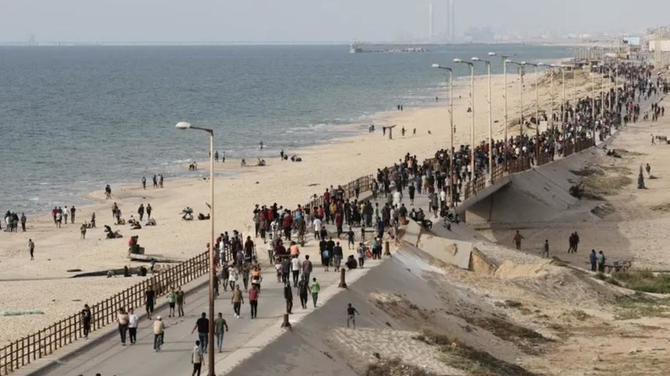
- No injuries were reported and the aid pier remains fully functional
TAMPA: Heavy seas battered the US maritime humanitarian mission to Gaza on Saturday, US Central Command (CENTCOM) said, with four vessels serving a floating aid delivery pier breaking free from their moorings.
No injuries were reported and the aid pier remains fully functional, CENTCOM said in a statement, adding that no US personnel would enter Gaza.
Two of the affected vessels were now anchored on the beach near the pier and the other two were beached on the coast of Israel near Ashkelon, CENTCOM said, adding that efforts to recover the vessels were under way with assistance from the Israeli Navy.
Rising cost of medicine in Egypt poses risk to ‘thousands of pharmacies’

- That review followed pharmaceutical companies’ request for price increases for various medications
- The EDA’s “decisions over (recent) years to raise the prices of certain types of medicine have resulted in the closure of about 1,500 pharmacies,” said Dr. Hatem El-Badawi
CAIRO: Pharmacy owners in Egypt have voiced concerns about the rising cost of pharmaceuticals in the country as they prepare for another price increase following the Egyptian Drug Authority’s recent review.
That review followed pharmaceutical companies’ request for price increases for various medications to “offset the rising costs of production, which have been exacerbated by the devaluation of the Egyptian pound against the dollar.”
The EDA’s “decisions over (recent) years to raise the prices of certain types of medicine have resulted in the closure of about 1,500 pharmacies,” said Dr. Hatem El-Badawi, secretary-general of the Pharmacy Division at the Federation of Egyptian Chambers of Commerce, adding that the “uncontrolled” rise in medicine prices has not been matched by a corresponding increase in profit margins for pharmacists.
“We anticipate more closures in 2024,” he added. “In February, the General Federation of Egyptian Chambers of Commerce appealed to the Central Bank governor to reactivate the low-interest rate loan of 5 percent for small and medium-sized pharmacies, capped at EGP500,000 ($10,600) per pharmacy.
“The goal was to safeguard pharmacies from economic challenges such as low purchasing power, cash payment demands from pharmaceutical companies, limited liquidity, rising operating costs, and shrinking profit margins.”
That proposal was rejected, however, and loans are currently only available at a 15-percent interest rate, which is, El-Badawi said, “far higher than a pharmacist’s profit margins and thus constitutes a loss.”
Pharmacy owner Dr. Sami Saad told Arab News: “We face several problems due to price increases, including reduced profit margins for pharmacists, dual pricing for drugs, and pharmaceutical companies not recalling expired products. All these issues could force us to close at any time because we are not making any profit.”
Saad added the Egyptian Drug Authority had not considered pharmacists’ demands or the crises they are facing.
“Every day is a struggle. And although I heard that the head of the authority plans to intervene to resolve these issues, there has been no progress so far,” he said.
Dr. El-Badawi reiterated: “I fear for the closure of pharmacies — a difficult situation that will only get worse. I am concerned for the 85,000 pharmacies across the country.
“The health of Egyptians is at risk,” he added. “I urge all responsible authorities to intervene.”





